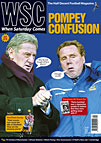 This may have been Real Sociedad's first title but, as Phil Ball reports, their victory reflected a change in the country as a whole
This may have been Real Sociedad's first title but, as Phil Ball reports, their victory reflected a change in the country as a whole
The long-term significance
This was the first of only two league titles won by Real Sociedad in their 96-year history. More generally, their last-gasp victory signalled a radical shift in Spanish football that mirrored the changes that had taken place in the country since Franco’s death in 1975. Between the arrival of the enormously influential Alfredo Di Stéfano at Real Madrid in 1953 and Sociedad’s first title, there had been a three-pronged hegemony. During those 28 seasons, Real Madrid won the title on 18 occasions, Atlético Madrid on five, with Barcelona on a mere four. The only other team to have a say were Valencia in 1971. Real Madrid’s imperious strut in this era brought about an upturn not only in their own fortunes but of the country as a whole, thus reviving and consolidating a weakening military dictatorship. Subsequently accused of being the “regime team”, Madrid’s ceding of the title to a Basque side was seen as evidence that a new democratic period was opening up in the footballing arena as well as the political one. Sociedad’s win began a period of four consecutive Basque titles between 1981 and 1984, shared out evenly with Athletic Bilbao. It seemed like a new dawn.
Story of the season
Sociedad had only missed out on the title in 1980 on the final day, when a bizarre 2-1 defeat at nine-man Sevilla, their first loss, presented Real Madrid with a fifth title in six years. But in 1980-81, with seven points fewer, Sociedad won the league on the “particular” goal average rule (still used today), whereby head-to-head records are decisive in the event of a tie on points. Nevertheless, the final day’s events are part of La Liga’s folklore. Real Madrid, expecting to win at a politically friendly Valladolid, would take the title in the event of Sociedad losing and Juanito, their emblematic and aggressive striker, had promised to crawl from the centre-circle to the changing rooms if they won. It had been a bitter season for Real, beaten in Paris by Alan Kennedy’s delicate chip in the European Cup final then knocked out of the King’s Cup by Sporting Gijón. They beat Valladolid 3-1 on the day, while Sociedad were losing 2-1 up in Gijón, prompting Juanito to begin his pilgrimage. Twelve seconds before the end, Jesus Zamora scored a dramatic equaliser for Sociedad, upon which news Juanito fell face down into the mud. Sporting Gijón continued to figure prominently, reaching the King’s Cup final, where they lost 3-1 to Barcelona.
For the record books
The new dawn proved a false one, since after 1984 Real Madrid returned to the podium, winning five consecutive titles before the Cruyff-managed “Dream Team” appeared at Barcelona. Almería, relegated with Murcia and Salamanca, are the only one of the three never to have returned to the top flight. Barcelona’s Quini finished top scorer on 20, despite missing four weeks of the season after being kidnapped. His captors kindly provided him with a TV so he could watch Spain beat England 2-1 at Wembley, a game in which he should have played. John Paul II survived an assassination attempt and went on to become paid-up member 108,000 at Barcelona.
Same place today
Nine of the teams who finished in the first ten are still playing in the top flight. Only Sporting Gijón have lost their elite status, relegated in 1998 with a paltry 13 points from 38 games. Zamora, the man who scored the mythical goal to win Sociedad the title, is still employed by the club as assistant coach to the present incumbent, Gonzalo Arconada – the brother of the famous goalkeeper.
Moved furthest away
Español, the less celebrated side from Barcelona, have Catalanised their name to Espanyol and moved up the hill in to the Olympic Montjuic Stadium. UD Las Palmas and Salamanca are down in the third level and the former almost went out of business last season.
Went on to greater things
José Mari Bakero ~ made his Real Sociedad debut. He later became the fulcrum of Cruyff’s Barcelona Dream Team and is now Sociedad’s technical director.
Iker Casillas ~ was born in May, the same month that another keeper, Andoni Zubizarreta, who went on to become Spain’s most capped player, was handed his first professional contract, by Athletic Bilbao.
Adidas ~ became the first sports clothing company to supply a Spanish side when Real Madrid took on the company and its logo. The marriage lasted for a single year, but was rekindled in 1998. In the 17-year gap, the company had done rather well.
Disappearing from view
Pirri (José Martinez Sánchez) ~ called it a day at Real Madrid after 16 seasons and became the club doctor. With 559 games, he held the record for appearances in the famous white shirt, but his mark would later be surpassed by Buyo, Sanchís and Hierro.
Juanito (Juan Gómez) ~ had his famous crawl from the centre-circle cut short by the news of Sociedad’s last-gasp goal. The player died tragically in a car accident in 1992.
Alberto Ormaetxea ~ managed Sociedad to their second title but left in 1985. He died in October 2005.
From WSC 230 April 2006. What was happening this month